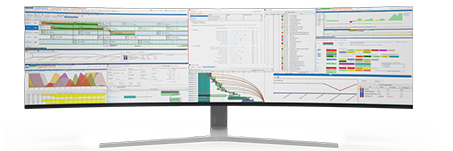SUSTAINABLE PRODUCTION PLANNING FOR RECYCLABLE MATERIALS
Supply Chain Managers face an ever-growing challenge – how to balance the increasing demand for high-quality pharmaceuticals with the imperative to adopt sustainable practices. The shift towards sustainable production planning, especially for recyclable materials, has become not just a choice but a necessity.
This blog explores the integration of PlanetTogether, a powerful production planning tool, with leading ERP, SCM, and MES systems like SAP, Oracle, Microsoft, Kinaxis, and Aveva to enhance sustainable production planning in pharmaceutical manufacturing.

The Need for Sustainable Production Planning
The pharmaceutical industry is under increasing scrutiny for its environmental impact. As consumers become more environmentally conscious, pharmaceutical companies are urged to adopt sustainable practices throughout their supply chain. Sustainable production planning is a crucial aspect of this transformation. It involves optimizing processes to reduce waste, energy consumption, and emissions while maximizing resource efficiency. In the context of pharmaceutical manufacturing, this often means a significant focus on the use of recyclable materials in the production process.
Challenges in Sustainable Production Planning
Sustainable production planning is not without its challenges, especially in an industry as complex as pharmaceuticals. Some of the key challenges include:
Material Traceability: Ensuring that recyclable materials meet regulatory standards and maintaining traceability throughout the supply chain.
Demand Fluctuations: Balancing the unpredictability of pharmaceutical demand with the need for sustainable production can be challenging.
Integration Complexities: Implementing sustainable practices seamlessly into existing systems without disrupting regular operations can be a daunting task.
Regulatory Compliance: Adhering to stringent environmental regulations while maintaining operational efficiency.
To tackle these challenges effectively, Supply Chain Managers need robust tools and systems that facilitate agile and sustainable production planning.
![]()

PlanetTogether: A Catalyst for Sustainable Production Planning
PlanetTogether is a cutting-edge production planning and scheduling software designed to optimize manufacturing processes. Its advanced algorithms and user-friendly interface make it an ideal solution for pharmaceutical manufacturers looking to enhance their sustainable production planning.
The integration of PlanetTogether with leading ERP, SCM, and MES systems offers Supply Chain Managers a holistic approach to sustainable production planning. Let's delve into the benefits of integrating PlanetTogether with some of the industry's top systems.
Integration with SAP
Enhanced Visibility: The integration with SAP provides real-time data synchronization, offering enhanced visibility into the entire supply chain.
Efficient Resource Utilization: PlanetTogether, when integrated with SAP, ensures that resources are utilized optimally, minimizing waste and reducing the environmental footprint.
Integration with Oracle
Streamlined Processes: The combination of PlanetTogether and Oracle streamlines production processes, making it easier to incorporate sustainable practices seamlessly.
Accurate Demand Forecasting: By leveraging Oracle's robust demand forecasting capabilities along with PlanetTogether's scheduling algorithms, Supply Chain Managers can align production with actual demand.
Integration with Microsoft Dynamics
Collaborative Planning: Microsoft Dynamics integration with PlanetTogether fosters collaborative planning, enabling cross-functional teams to work together towards sustainable production goals.
Data-driven Decision Making: The integration empowers Supply Chain Managers with data-driven insights, facilitating informed decision-making for sustainable practices.
Integration with Kinaxis
Agile Response: The integration with Kinaxis ensures an agile response to changing market dynamics, helping pharmaceutical manufacturers adapt their sustainable production plans quickly.
Scenario Analysis: PlanetTogether and Kinaxis together enable detailed scenario analysis, allowing Supply Chain Managers to assess the environmental impact of different production scenarios.
Integration with Aveva
Operational Excellence: Integrating PlanetTogether with Aveva enhances operational excellence, optimizing production schedules for maximum efficiency and minimal environmental impact.
Compliance Assurance: The combination ensures that sustainable production plans adhere to environmental regulations, minimizing the risk of non-compliance.
Overcoming Integration Challenges
While the benefits of integrating PlanetTogether with leading ERP, SCM, and MES systems are evident, it's crucial to address potential integration challenges. Here are some strategies to overcome these challenges:
Thorough Planning
Conduct a comprehensive analysis of existing systems and processes before initiating integration.
Develop a detailed integration plan that considers the specific requirements of sustainable production planning.
Collaboration with IT Teams
Engage closely with IT teams during the integration process to address any technical issues promptly.
Ensure that security measures are in place to protect sensitive production and planning data.
Training and Change Management
Provide adequate training to employees to familiarize them with the integrated systems.
Implement change management strategies to ease the transition and ensure a smooth workflow.
Continuous Monitoring and Improvement
Regularly monitor the integrated systems to identify any issues or areas for improvement.
Implement feedback loops to continuously enhance the sustainability of production planning processes.
Sustainable production planning for recyclable materials is a critical imperative for pharmaceutical manufacturers. The integration of PlanetTogether with leading ERP, SCM, and MES systems such as SAP, Oracle, Microsoft, Kinaxis, and Aveva provides Supply Chain Managers with a powerful toolkit to address the challenges of sustainable production planning effectively.
By leveraging the capabilities of these integrated systems, pharmaceutical companies can not only meet the increasing demand for high-quality products but also contribute to a more sustainable and environmentally friendly future. The journey towards sustainable production planning is a collaborative effort that requires the commitment of the entire organization, and the integration of advanced tools is a significant step in the right direction.
Topics: PlanetTogether Software, Accurate Demand Forecasting, Integrating PlanetTogether, Efficient Resource Utilization, Enhanced Visibility, Efficient What-If Scenario Analysis, Compliance Assurance, Automation and Data-Driven Decision Making




















LEAVE A COMMENT